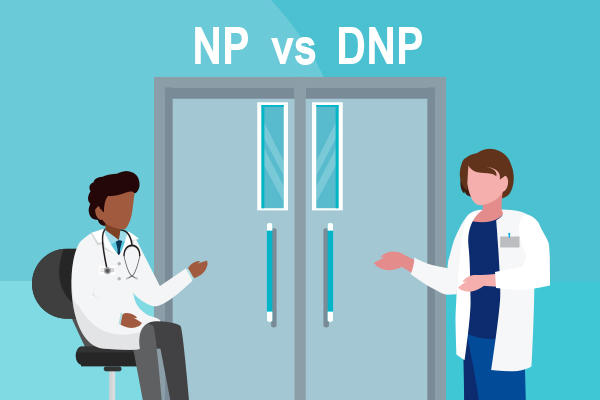Featured
Tags
Share
- Home / Blog / Nursing Today / DNP vs. PhD: What’s the Difference Between the Two Degrees?
DNP vs. PhD: What’s the Difference Between the Two Degrees?

Are you a registered nurse or advanced practice registered nurse who wants to further your education? As you are considering post-master’s degree programs, you may be wondering what the difference is between a Doctor of Nursing Practice (DNP) and a Doctor of Philosophy (PhD) in nursing.
Simply put: A DNP can help advance your career on the clinical/practice side, while a PhD in nursing focuses on teaching and research. Both are considered terminal degrees for nurses, meaning they are the highest degrees awarded in the nursing profession.
Selecting which degree journey to take depends on your career goals. If you’re an MSN-prepared nurse working in an advanced role, you may be thinking about earning a DNP to help improve patient outcomes and translate research into practice. Or if your goal is to expand into education and research, you may want to consider pursuing a PhD and conducting research to advance the science of nursing.
Let’s take a closer look at the DNP degree and how it can prepare you for the highest level of professional nursing practice:
1. Serve as a transformational leader.
With a DNP, you will be prepared to work in leadership roles in a variety of healthcare delivery settings, paving the way for healthcare services that result in quality improvement and increased patient safety. You’ll be able to:
• Lead practice change
• Advance expertise in a variety of topics
• Lead healthcare services that result in quality improvement and increased patient safety
“Earning my doctorate is a life dream, an accomplishment that is going to help me to propel nursing further,” said Chamberlain DNP graduate Melinda Spencer-Smith. “I’ve now reached the level of a transformational leader. I'm able to help others make changes, I'm able to bring research into the practice setting and be someone that can bridge the gap between research and nursing in the work setting.”
2. Enhance your opportunity for advancement in a variety of roles.
A DNP prepares you for a wide range of roles in a variety of healthcare settings, including (but not limited to):
• Nurse Midwives
• Nurse Practitioners
Keep in mind that some careers may require several years of experience in addition to educational credentials.
Chamberlain graduate Melani Bell credits earning her DNP, as well as her background in case management, for helping her secure her role as a nurse case management consultant with a premier government contractor.
“A DNP degree has allowed me ‘a seat at the table,’” Dr. Bell said. “I have a voice amongst a group of subject matter experts both in clinical and non-clinical settings that include senior leadership in the federal government, federal contractors, hospital administrators and senior military leaders. This new experience allows me to proudly represent the nursing profession and articulate the importance of nurses participating in healthcare decision-making.”
3. Care for vulnerable, culturally diverse populations.
You can help lead the charge in caring for underserved and culturally diverse communities.
As part of her DNP project and practicum, Chamberlain DNP graduate Catherine Browning took the lead in improving the cultural competency of the staff at her facility in working with Middle Eastern clients and enhancing patient care. By conducting extensive research on such topics as cultural competency, educational training, assessment tools, organizational change models and healthcare issues relevant to Middle Eastern patients, she was able to implement an interprofessional education program for the clinic staff that focused specifically on Middle Eastern culture.
“Most importantly,” Dr. Browning said, “I hope to share my knowledge of Middle East cultural care issues through writing, teaching and presenting. I hope to be an even more responsible liaison, building peace and cultural understanding between two unique and gifted regions of the world–the United States and the Middle East.”
4. Serve as a mentor and role model to other nurses aspiring to lead and change healthcare.
You can serve as a leader for change within your organization and beyond.
For Chamberlain DNP graduate Mary Sas, she wanted to serve as a role model to the nurses at her hospital when she decided to go back to school to earn a DNP degree.
“The hospital system (where I work) has a goal to have 80% of its nurses BSN-educated by 2020,” she explained. “I thought, ‘How can I ask our nurses to go back to school without setting an example?’ And because we have few options in the community, I knew that I could be a mentor and preceptor for my staff if they needed one.”
Depending on where you want to focus your career, either a DNP or PhD degree can be a great option for you. If you’re interested in learning more about Chamberlain’s DNP program, request more information here.
By Agnes Hicks
More from Nursing Today
Request More Information
To receive the Chamberlain University Program Guide, including associated career paths, please select a program of study.







